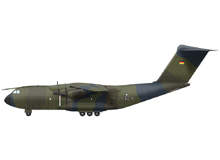
Defence spending is under pressure around the world as government finances are squeezed by the recession. Such is the state of the UK government’s finances, for example, that the opposition Conservative Party, which has traditionally advocated robust spending on the military and has been an ardent supporter of a nuclear deterrent, has questioned if the country can afford to maintain its Trident nuclear missile programme.
Unsurprisingly in this environment, the Conservatives (who may return to government in 2010) are also considering abandoning other defence programmes, including the A400M military transport aircraft, which is being produced by EADS. The delays surrounding Europe’s biggest military project have reportedly angered Germany as well as Britain, while the cost of the aircraft, estimated at €100m ($131.7m) each, is also a matter of concern.
Engine trouble
The A400M, designed to carry troops and heavy equipment to rugged areas such as Afghanistan, was ordered by seven European Nato countries in 2003. The plane was due to be delivered in 2009 but has yet to make its maiden flight – this is now expected before the end of the year with deliveries taking place around three years later.
Problems surrounding the TP400 engines have contributed to the delays – they have had trouble running at full power – and the aircraft’s design has also been called into question.
Furthermore, the engine manufacturer Europrop International (EPI) has admitted that it only realised in 2008 that, while it had military approval for the use of the full authority digital engine control (FADEC), its contract with Airbus also required it to meet civil aviation requirements before the craft could legally fly. EPI president Nick Durham said that the FADEC issue contributed heavily to delays.
How well do you really know your competitors?
Access the most comprehensive Company Profiles on the market, powered by GlobalData. Save hours of research. Gain competitive edge.

Thank you!
Your download email will arrive shortly
Not ready to buy yet? Download a free sample
We are confident about the unique quality of our Company Profiles. However, we want you to make the most beneficial decision for your business, so we offer a free sample that you can download by submitting the below form
By GlobalDataThese blunders have provided ammunition to the programme’s critics. In addition, Britain and France say they need to receive delivery as soon as possible to support global operations and renew aging transport fleets. They might thus be tempted to opt for a more readily available alternative. French defence officials are already reported to have talked to Boeing about the potential purchase of C-17s. The UK has also said that it would consider buying C-17s and C-130s if the A400M programme were cancelled. Meanwhile, South Africa, which is also a partner in the A400M programme, has said that it is considering the purchase of C-17s, Russian aircraft or the Brazilian C-390.
However, we spoke to an analyst who says that while the C-17 could fill a short-term gap before the A400M is delivered, the latter aircraft has significant advantages over the C-17 in terms of cost and capability.
and heavy equipment to rugged areas such as Afghanistan.”
“The C-17 is a fine aircraft but it costs twice as much to buy and three times as much to maintain as the A400M. It can also carry only two-thirds of the payload of the A400M. It is also unlikely that potential buyers such as the British would put the C-17 in harm’s way – it can’t, for example, do tactical approaches,” the analyst said.
Although buyers could have triggered delay clauses on 1 April, which would have forced EADS to return €5.7bn in development costs, they have agreed to a moratorium on the delay clauses until July while talks are held with EADS. In May, an industry spokesman associated with the programme said that negotiations between EADS and the governments of seven partners – Britain, France, Germany, Spain, Belgium, Luxembourg and Turkey – were making ‘progress’ and that they were ‘quietly confident’ that the programme would proceed. While South Africa and Malaysia have agreed to buy export versions they have had no role in the current contract negotiations.
Demands = delays
EADS has said that the delays have been caused partly by the individual demands of various countries. Germany, for example, wants the aircraft it is ordering to have the ability to ‘hug’ the landscape to avoid attack. However, EADS reportedly would like to produce a basic version of the plane in the first phase to reduce the development risk, adding more complex features at a later stage.
EADS admitted that it has not covered itself in ‘shining glory’ with the A400M but it says it is ‘doing its best to redress the situation’. Airbus is hoping that the seven governments will commit to the programme before the Paris Air Show in June 2009.



